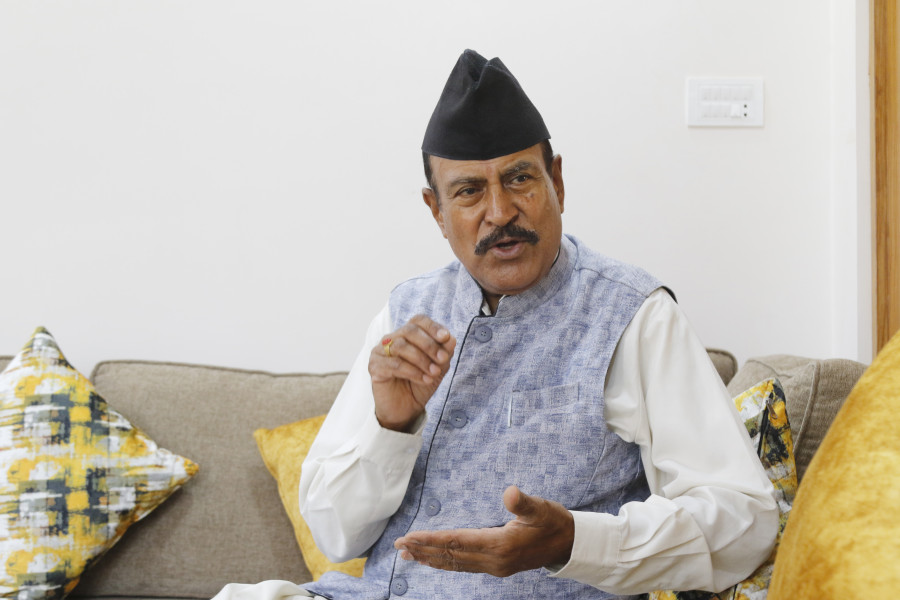Interviews
‘The central bank should regulate cooperatives’
Gauri Bahadur Karki, former chairperson of the Special Court, who headed an inquiry commission formed to look into troubled saving and credit cooperatives, on the current crisis in the cooperatives.
Prithivi Man Shrestha
Gauri Bahadur Karki, former chairperson of the Special Court, was also the head of an inquiry commission formed in 2013 to look into troubled saving and credit cooperatives. His team had collected around 13,000 complaints from depositors of troubled cooperatives. Karki talked to the Post’s Prithvi Man Shrestha about the current crisis in the cooperatives whereby thousands of depositors have taken to the streets after failing to recover their savings from the cooperative. Excerpts:
What do you see as the main reason behind the current crisis in cooperatives?
Weak regulation, I would say. It was the same when a number of cooperatives including Oriental and Guna plunged into a crisis a decade ago and there has been little change on the ground despite relatively improved regulatory provisions. Even now, cooperatives continue to invest in land and pay interest after generating profits from selling such land. Otherwise, they would not be able to offer such a high interest rate on deposits.
After the government halted land-plotting last year, many cooperatives failed to sell the land, which resulted in them failing to pay promised interest and the depositors who could not recover their money had to stage protests. Besides investing in land, misappropriation of funds by the cooperatives’ promoters is another problem. There has been little change in the past decade since we presented a report on how to address the problems in the cooperative sector.
What were the key recommendations of the commission that you headed?
In early 2010s, the cooperatives started getting into trouble after the Nepal Rastra Bank tightened provisions on lending to the real estate. The cooperative promoters who had invested heavily in the estate sector failed to pay the interest as they could not sell the land they invested in. The depositors were turned back empty handed; they could not withdraw their own money. As a number of cooperatives got into trouble, the government formed a high level commission under my leadership. The commission was mandated to recommend ways to address the issues of cooperatives including on legal provisions to be introduced.
We recommended a new law with stringent regulatory provisions. We had prepared a draft of the cooperative bill and handed it to the government as well. We advised that the cooperatives should not be allowed to collect more in deposits than did banks and financial institutions and they should not be allowed to expand branches beyond certain areas. Likewise, we recommended that a board member of one cooperative should not be allowed to become a board member of another. We also suggested the central bank should regulate cooperatives with over Rs5 million in annual deposit collection.
How many of the commission’s recommendations were incorporated in the new Cooperative Act-2017?
The government had prepared a bill accommodating most of our recommendations. But lawmakers proposed around 600 amendments to the bill that the government had registered at the parliament. Mostly, they were lawmakers who were operating cooperatives or had direct interest in cooperatives. The Ministry of Cooperatives urged me to review those amendment proposals. I suggested that regulatory provisions should not be weakened as sought by the lawmakers. The relevant minister at the time sought my advice, complaining that many lawmakers were trying to block the new cooperative bill because of the proposed stringent measures. For example, we had suggested that an operator be subjected to imprisonment of 20 years for causing loss of over Rs10 billion to a cooperative. But the lawmakers lowered the punishment. Then I suggested the minister get the bill endorsed by the Parliament even if certain compromises needed to be made. I said so because the Cooperative Act-1922 was worse and had no regulatory oversight mechanism. The Parliament endorsed the bill after removing many of the proposed stringent proposed measures.
Can’t members of the cooperatives intervene during the AGM?
Many people deposit money in cooperatives just to get more interest than what would be available from banks and financial institutions. Most of them participate in the AGM only to partake in the feast. They don’t care so long as the operator of the cooperative pays the interest. Some cooperatives take their elderly members for a pilgrimage just to give a good impression of how well they are being run. There is scrutiny neither from the regulator such as the Department of Cooperatives nor from the members of cooperatives.
Why do you think the agencies formed to supervise cooperatives have failed?
Even though the law has given certain regulatory power to institutions like the Department of Cooperatives, often, people from the regulatory agencies themselves engage in corruption for personal gains. For example, cooperatives like the Oriental and Guna faced a crisis in the early 2010s. Before their situation turned critical, inspection reports of the Department of Cooperatives had found no problems in these cooperatives. This happens as the promoters of cooperatives bribe the officials of the regulatory body.

Assistants of Sudhir Basnet, the infamous promoter of Oriental Cooperative, told me that he used to bribe members of the inspection team with packets of cash. So it is natural to assume that the inspection team submitted a report mentioning all good things about the cooperative. It is not difficult for the regulatory agency to find wrongdoing if there is a genuine attempt to do so.
Now, the regulatory authority appears to have been divided among three layers of the government. How is this affecting regulation of cooperatives?
Currently, there is confusion about which tier of the government is responsible for regulating the cooperatives. Provincial and local governments are in the dark about this. In the past, there were Division Cooperatives offices under the Department of Cooperatives and they had power to supervise the cooperatives in particular areas. Now, the provincial and local governments are unsure about how to regulate the cooperatives. The federal government should have prepared common standards for the regulation of cooperatives. The sub-national governments could regulate them based on those standards. The Department of Cooperatives understands the weaknesses in regulation. It should have advised the regulatory agencies in the provinces and local bodies how to better regulate them.
The Department of Cooperatives now does not care about regulating cooperatives that don’t fall under its purview. Meanwhile, the regulatory agencies at the provincial and local levels don’t have in-depth knowledge and capability to regulate the cooperatives. So the central agency should help strengthen the capacity of the sub-national government agencies. I believe poor regulation and weak capacity of the regulatory agencies are responsible for current problems in the cooperatives.
A brief video of the conversation:
Conceptually, the cooperatives are considered as self-governing entities and cooperative promoters argue that there is no need for external regulation. Why do you think strong oversight by an outside regulatory body is a must?
Conceptually, a cooperative is opened by local people to do something good for the society. So the cooperatives should have limited members and their working areas should be confined to certain geographic locations. Now, everybody from Mechi to Mahakali can become members of a cooperative. They can open branches in every district. Some cooperatives collect more deposits than even the development banks and finance companies.
The cooperatives have been hiding places of black money because of poor regulation. For example, in Oriental Cooperative, there have been suggestions that its promoter Sudhir Basnet had returned the money of certain people before the organisation started getting into trouble. But it did not maintain the record of all withdrawals.
The commission you headed had recommended NRB regulation of big cooperatives. Why could it not happen?
We had recommended that the NRB regulate the big cooperatives with annual turnover of over Rs5 million. When we asked then governor Yubaraj Khatiwada, he had responded that the central bank could not do so as it had to regulate many banks and financial institutions. The NRB is a strong regulatory body and it can help bring the cooperatives back on track. Other regulatory agencies are not as independent. Political influence is also high in other regulatory agencies compared to the central bank. Anyway, a bill has again been registered in the Parliament authorising the central bank to regulate the big cooperatives. It will hopefully pass.
Some stakeholders are calling for a separate regulatory agency for cooperatives. Is it a good idea?
If a cooperative is doing well, it does not matter who the regulator is. But those involved in shady deals don’t want a strong regulatory body. Some lawmakers have sought separate regulatory institutions. My recommendation is that instead of creating a new regulatory body whose office bearers are appointed by the government, it is better to strengthen the Department of Cooperatives with stronger laws. Even better would be to create a second tier institution under the Nepal Rastra Bank to regulate the cooperatives.




 16.12°C Kathmandu
16.12°C Kathmandu




.jpg&w=200&height=120)







